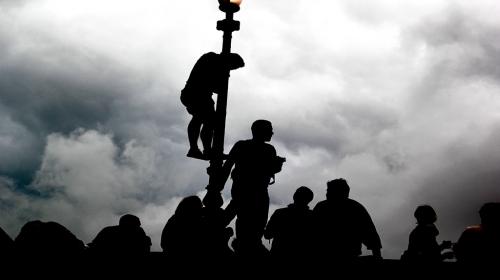
Peter Beinart recently published a very interesting article on the Daily Beast making an argument that, if correct, could have very significant implications for privacy and other civil liberties in coming decades.
In essence, Beinart argues that the Reagan era has come to an end.
Historians often speak of the period from 1932 through 1980 as the New Deal Political Order—a period characterized by a Democratic political majority made possible by a coalition of Southern whites, northern liberals, African Americans, and unions. Although the Democrats won some battles and lost others, the political debates of the era were defined by the Democrats to such an extent that even when they lost, they often won, as when Richard Nixon supported policies that were pro-environment, pro-Social Security, and pro-national health care.
The realignment of 1980 represented the end of that era, and its replacement by a more conservative one in which a new “intergenerational debate” (as Beinart terms it) took place “between the yard lines Reagan and Clinton set out.” In this era, the Republicans often won even when they lost, as Bill Clinton for example rolled back welfare benefits.
Beinart argues that for political purposes “generations” do not conform to the usual categories of the Silent Generation, Boomers, Gen-Xers, and Millennials—but are defined by historical events.
To understand what constitutes a political generation, it makes more sense to follow the definition laid out by the early-20th-century sociologist Karl Mannheim. For Mannheim, generations were born from historical disruption. As he argued—and later scholars have confirmed—people are disproportionately influenced by events that occur between their late teens and mid-twenties. During that period—between the time they leave their parents’ home and the time they create a stable home of their own—individuals are most prone to change cities, religions, political parties, brands of toothpaste. After that, lifestyles and attitudes calcify.
And politics in recent decades, he argues, has been defined by this dynamic:
the men and women who today dominate American politics constitute a political generation because during their plastic years they experienced some part of the Reagan-Clinton era. That era lasted a long time. If you are in your late 50s, you are probably too young to remember the high tide of Kennedy-Johnson big government liberalism. You came of age during its collapse, a collapse that culminated with the defeat of Jimmy Carter. Then you watched Reagan rewrite America’s political rules. If you are in your early ‘40s, you may have caught the tail end of Reagan. But even if you didn’t, you were shaped by Clinton, who maneuvered within the constraints Reagan had built.
The Millennial Generation, however, is likely to become a new “political generation,” Beinart argues.
By pre-Reagan standards, the economic debate is taking place on the conservative side of the field. But—and this is the key point—there’s reason to believe that America’s next political generation will challenge those limits in ways that cause the leaders of both parties fits.
Beinart argues that the defining event for this new generation was not 9/11 as one might think, but an economy that has performed very poorly since the recession of 2001—especially for the young—and the decline of government support for higher education, which has left this generation with more debt than its predecessors. Beinart marshals polling data across many issue areas to argue that these experiences and others have created a generation that is far more liberal than its predecessors.
So what does all this have to do with privacy and civil liberties?
Although Beinart’s analysis is focused on economic issues and on the partisan political implications of this shift, as he notes in passing, Millennials in polls tend to put a far higher priority on civil liberties over security. Beinart notes that the Pew Research Center has consistently found that Millennials, unlike all the older generations, reject the idea that “it will be necessary for Americans to give up some civil liberties” to curb terrorism. Fully 72% of Millennials answered “no” to that question in 2011, while the other age groups were all evenly divided. That was well before the revelations by Edward Snowden (who I would note is himself 30 years old). I would add that in a July 2013 post-Snowden poll, Millennials said by a two-to-one margin (60%-29%) that the government had gone too far in restricting civil liberties rather than not going far enough to protect the country. Although other age groups now agreed, it was by distinctly smaller margins. Millennials were also more likely to say that the NSA release “serves the public interest.” A TIME poll similarly found that “Americans aged 18 to 34 break from older generations in showing far more support for Snowden’s actions,” with just 19 percent of that age group saying that his whistleblowing was a “bad thing.”
I would add one additional factor to the polling data. Beinart argues that Millennials are likely to break outside the boundaries of political debate as they have been defined in the Reagan-Clinton era, and that this generation’s radicals are much more likely to “disrupt social order” than those of the “Reagan-Clinton era.”
Look at the forces that created Occupy Wall Street. The men and women who assembled in September 2011 in Zuccotti Park bore three key characteristics. First, they were young. According to a survey published by City University of New York’s Murphy Institute for Worker Education and Labor, 40 percent of the core activists involved taking over the park were under 30 years old. Second, they were highly educated. Eighty percent possessed at least a bachelors’ degree, more than twice the percentage of New Yorkers overall. Third, they were frustrated economically. According to the CUNY study, more than half the Occupy activists under 30 owed at least $1,000 in student debt. More than a one-third had lost a job or been laid off in the previous five years. In the words of David Graeber, the man widely credited with coining the slogan “We are the 99 percent,” the Occupy activists were “forward-looking people who had been stopped dead in their tracks” by bad economic times.
For a moment, Occupy shook the country. At one point in December 2011, Todd Gitlin points out in Occupy Nation, the movement had branches in one-third of the cities and towns in California. Then it collapsed….
But the forces that drove it are unlikely to subside. Many young Americans feel that economic unfairness is costing them a shot at a decent life. Such sentiments have long been widespread among the poor. What’s new is their prevalence among people who saw their parents achieve—and expected for themselves—some measure of prosperity, the people Chris Hayes calls the “newly radicalized upper-middle class.”
If Beinart’s argument is correct, it is another reason why respect for privacy and civil liberties is likely to remain high among the Millennial generation: those who push political debate beyond “accepted” limits, and those who engage in protests that “disrupt social order,” are the people most likely to find the hammer of local, state, and federal level security forces coming down hard upon them. They are the people most likely to understand that civil liberties are not an abstract issue.
Young people, of course, do not rule the world. Does it make any difference that they appear to have attitudes making them less sympathetic to the national security establishment?
Beinart argues that it will make a very significant difference. First, he argues that the attitudes that Millennials are developing now are likely to persist. As noted above he argues that attitudes forged by early experiences are likely to calcify. Furthermore, he argues,
There is more reason to believe these attitudes will persist as Millennials age than to believe they will change. For starters, the liberalism of Millennials cannot be explained merely by the fact that they are young, because young Americans have not always been liberal. In recent years, polls have shown young Americans to be the segment of the population most supportive of government-run health care. But in 1978, they were the least supportive. In the last two elections, young Americans voted heavily for Obama. But in 1984 and 1988, Americans under 30 voted Republican for president.
Nor is it true that Americans necessarily grow more conservative as they age. Sometimes they do. But academic studies suggest that party identification, once forged in young adulthood, is more likely to persist than to change….
In the 2008 presidential election, Millennials constituted one-fifth of America’s voters. In 2012, they were one-quarter. In 2016, according to predictions by political demographer Ruy Teixeira, they will be one-third. And they will go on constituting between one-third and two-fifths of America’s voters through at least 2028.
Of course, attitudes towards privacy and the national security state tend not to break along traditional liberal-conservative lines, and to the extent that the Millennial generation becomes more economically liberal in the way Beinart describes, it will not necessarily become more pro-privacy and civil liberties. But it appears that for whatever reason, Millennials are becoming more pro-civil liberties—and many of the generational dynamics that Beinart argues for in the context of the greater economic liberalism he sees would also apply to those issues.
I’ve previously argued against the notion that there’s some “massive generational shift in attitudes toward privacy” with younger people not caring as much about privacy as older Americans. And Beinart’s argument implies that not only is there not a shift in that direction, but that we may be seeing a shift in the other direction. Of course the nature of “generations” and their political beliefs is a highly complex topic and it’s possible that Beinart is misinterpreting what is happening in ways minor or major. But if the basic thrust of his argument is correct, or at least it’s correct that Millennials are going to remain more skeptical about the national security state, then that is good news on the privacy front.




